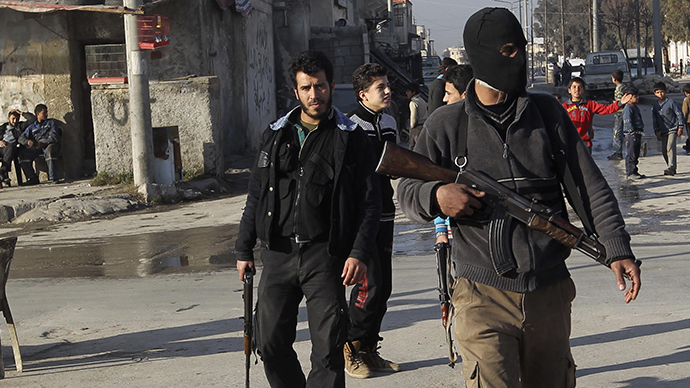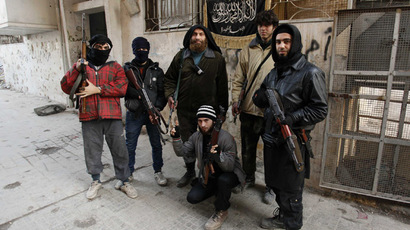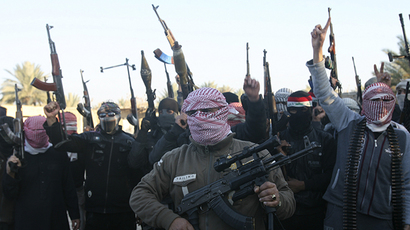Nearly 500 killed in fighting between Syrian rebels and Al-Qaeda

Almost 500 people, including 85 civilians, were killed during in-fighting between rebel groups and an Al-Qaeda branch in Syria in the past week, an activist group reported.
The Britain-based Syrian Observatory for Human Rights stated that at least 482 people were dead since the fighting between moderates and mainstream rebel factions versus Islamic State of Iraq and the Levant (ISIL) intensified on January 3.
The group added that 157 individuals were from the ISIL, 240 others were from more moderate factions and 85 were civilians.
Initially the Islamic State of Iraq and the Levant (ISIL) were fighting on the side of the moderates to oust Syrian President Bashar Assad in a conflict that began in March of 2011.
The fighting between the rebels had spread across northern Syria over the past week. The most recent violence broke out on Friday in the province of Aleppo, after the ISIL killed a local doctor.
Nusra Front, which also shares a radical ideology but is composed mostly of local fighters, united with several other splinter groups to carry out reprisal attacks against ISIL throughout the country.
There had been previous resentment towards the group – staffed predominantly with non-Syrian fighters – for the harsh regime it has imposed on controlled areas in the country since entering the war last year.
ISIL is also engaged in conflict in Iraq's Anbar Province, which it plans to unite with Syria to form a caliphate. The military group is known as the most radical jihadist wing of the Syrian rebels. The Islamic State of Iraq and the Levant’s roots go back to the early years of the Iraq War. It was established in April 2004 by Sunni extremists, and then pledged allegiance to Osama bin Laden.
At that time, ISIL was called Al-Qaeda in Iraq. Two years later the group was rebranded as the Islamic State of Iraq. In 2013, it gained a strong presence in northern Syria, adding ‘Levant’ to its name.
On Friday the UN Security Council criticized the latest terrorist attacks in Iraq and adopted its first statement of the new year, expressing support for the Iraqi government in its fight against terrorism.
“The Security Council deplores in the strongest terms the recent events in the cities of Ramadi and Fallujah in Anbar province in Iraq. The Security Council condemns the attacks that are being perpetrated by Al-Qaeda affiliate, the Islamic State in Iraq and the Levant,” the statement read.
“The Security Council urges the people of Iraq, including Iraqi tribes, local leaders, and Iraqi security forces in Anbar province, to continue, expand and strengthen their cooperation against violence and terror.”
Syrian extremists recruit westerners
Back in Syria, the conflict has been growing and preoccupying world leaders’ minds.
The FBI’s director revealed that tracking Americans who have returned from Syria has become among the bureau’s highest counter-terrorism priorities. According to senior counter-terrorism officials, Islamic extremist groups in Syria with ties to Al-Qaeda are trying to identify, recruit and train Americans and other westerners who have travelled there, and looking to have them carry out attacks once they have returned home.
US officials say that at least 70 Americans have either travelled to Syria or tried to since the civil war started three years ago. That number was never disclosed until Thursday.
Syria’s civil war has become a magnet for westerners seeking to fight with rebels against the government of President Bashar Assad.
In the meantime, US President Barack Obama is deciding whether or not to resume non-lethal military aid to Syria’s moderate opposition. The US halted shipments last month after warehouses filled with equipment were seized by the Islamic Front, a coalition of rebel fighters that broke off from the US-backed Free Syrian Army.
Experts warn about resuming the non-lethal aid. “US provided lethal assistance through Jordan, CIA and through Turkey to the opposition. But the opposition is fragmented, incapable and more radical elements, principally, the foreign fighters have taken over the opposition in terms of the fighting. And inevitable what will happen if you start to pass weapons to the opposition, they will fall into the hands of the extremists,” Security analysts and former Pentagon official Michael Maloof told RT.














